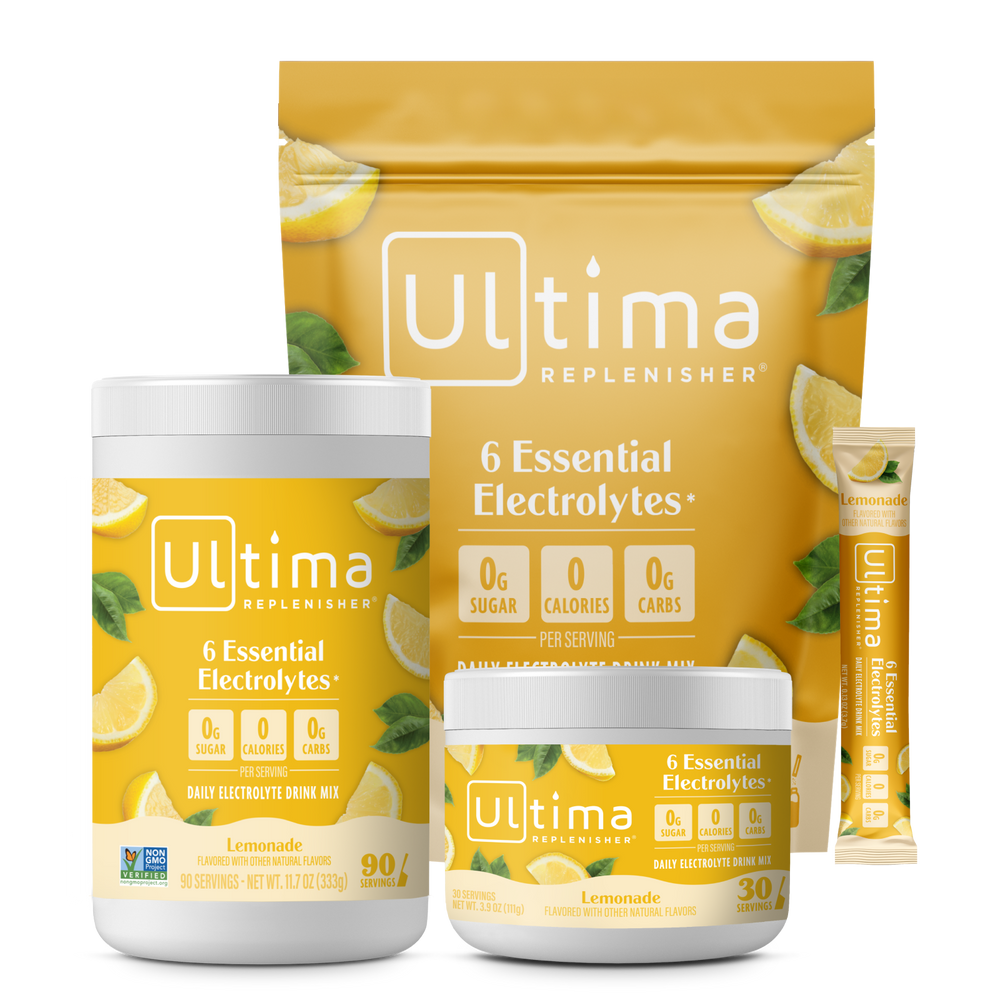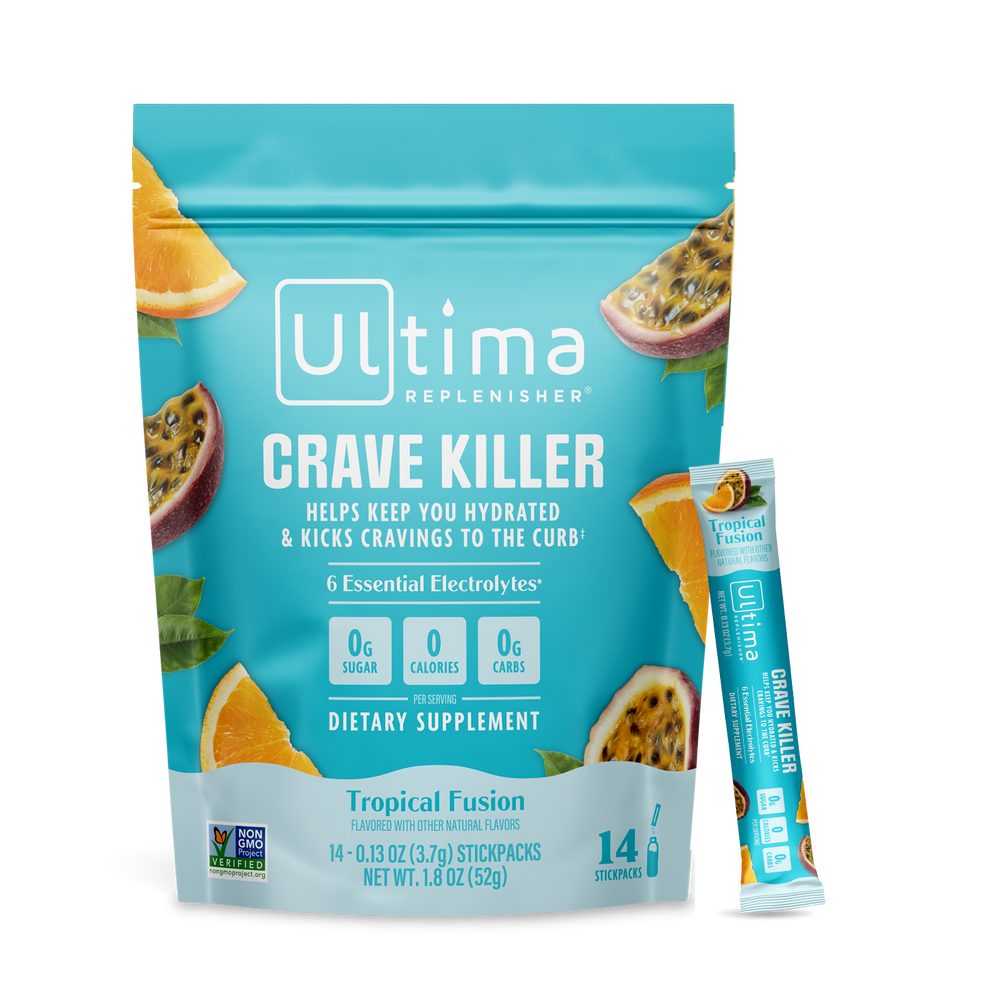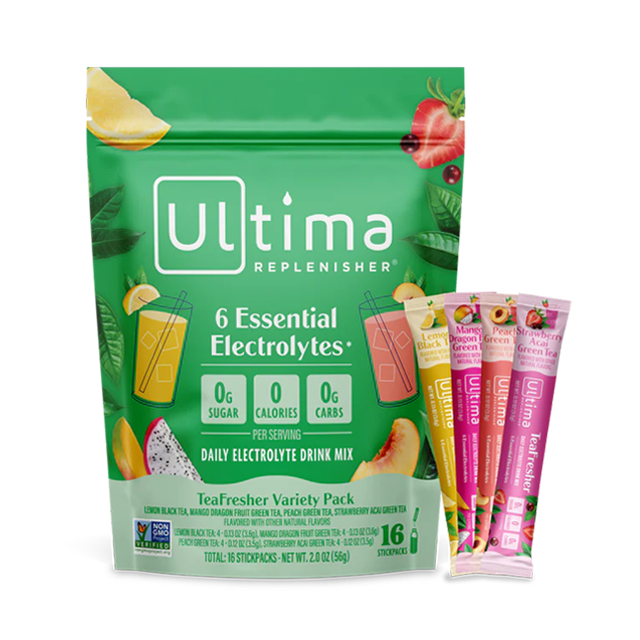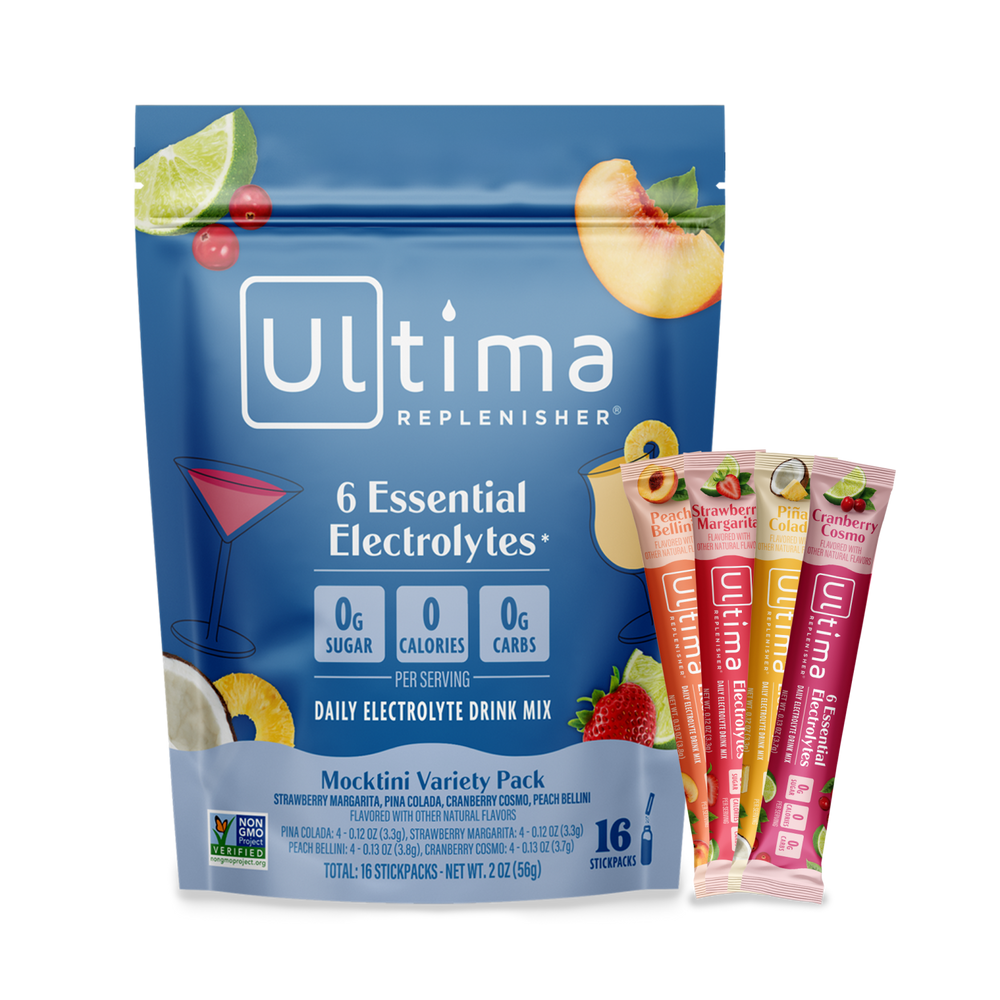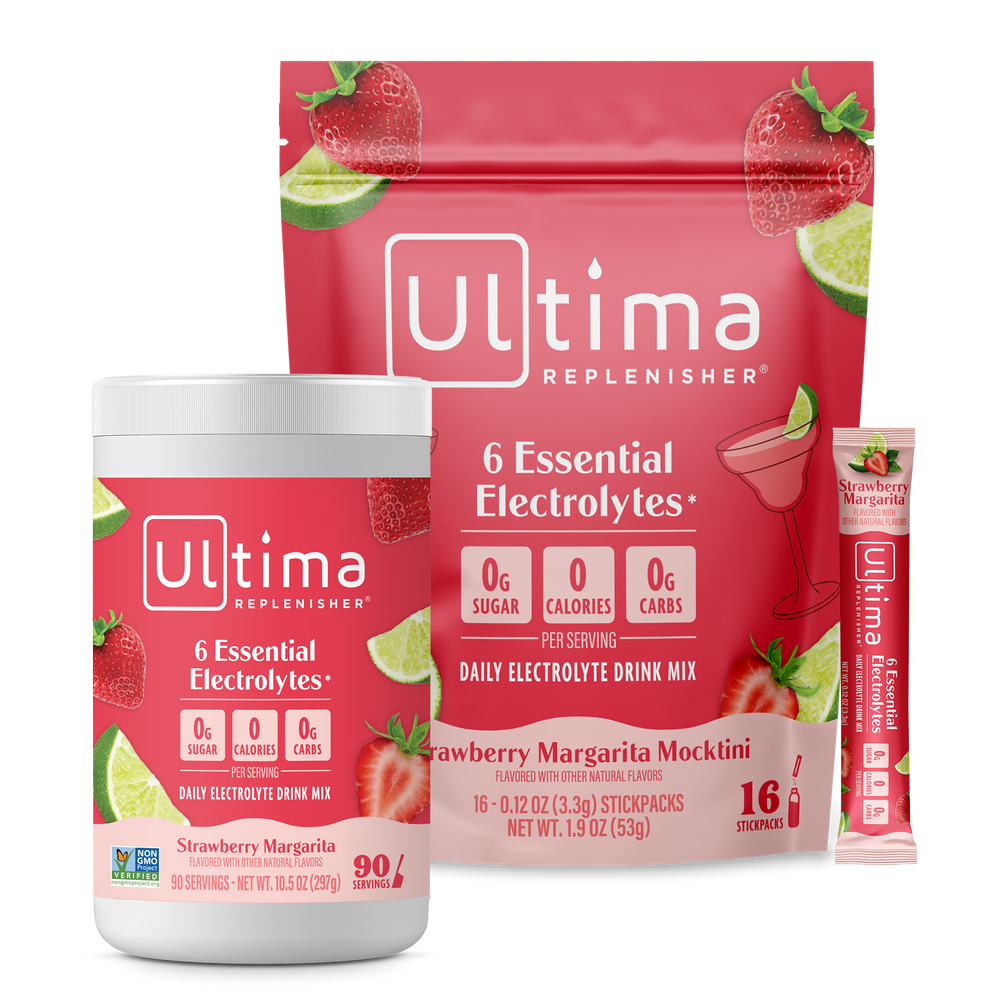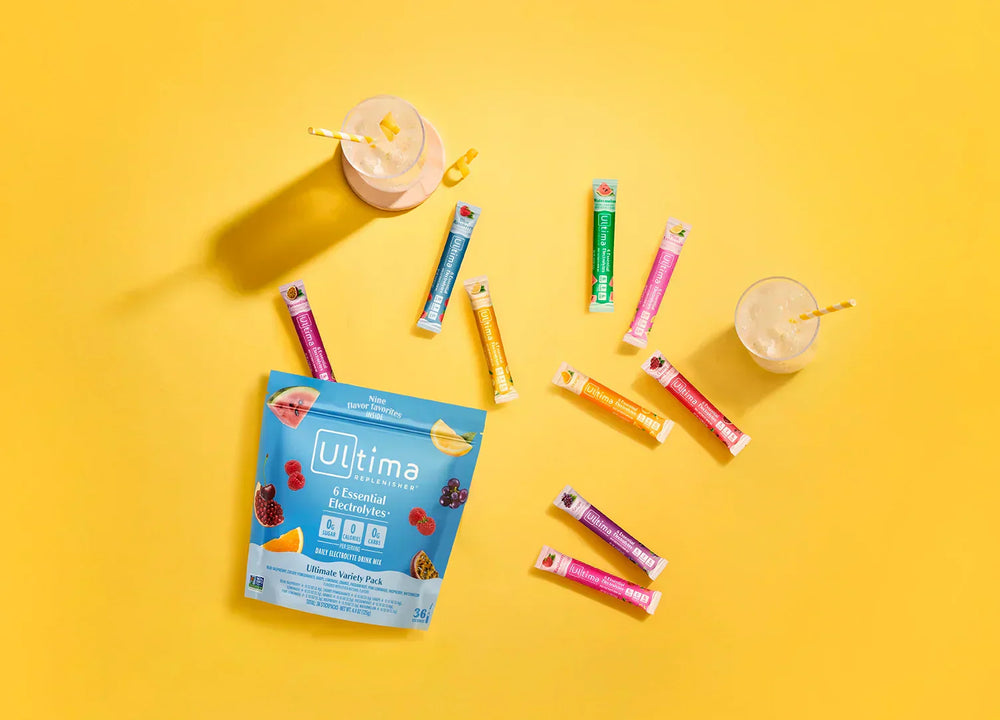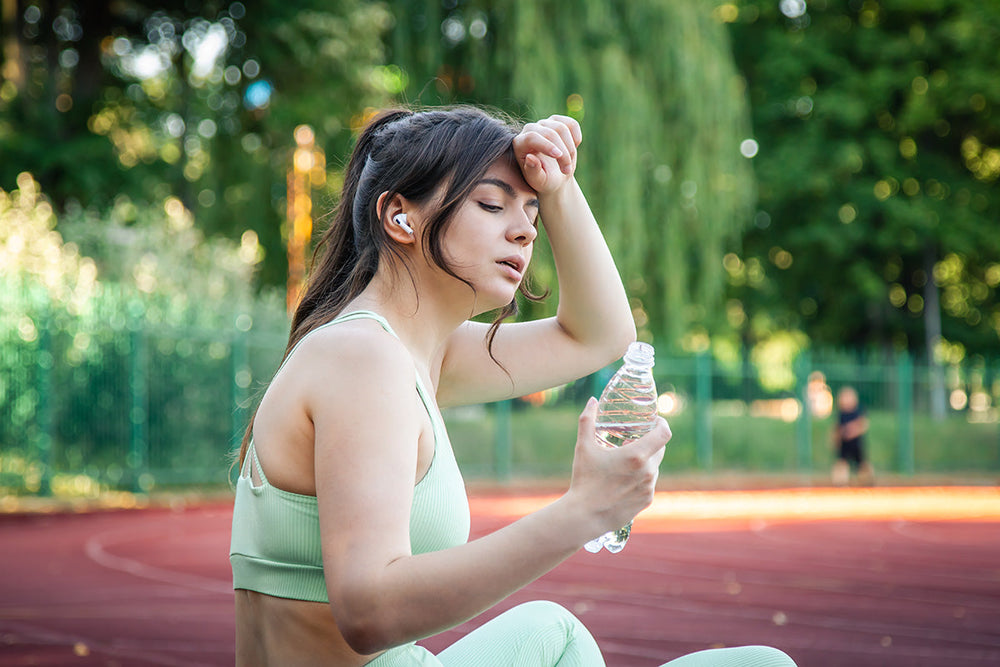
Keto and Electrolytes: Why They Matter More Than You Think
Keto and electrolytes: why they matter more than you think
The ketogenic diet has become one of the most popular nutrition strategies out there, praised for its weight loss, blood sugar and wellness benefits.
Thinking about giving keto a try, or already living that #lowcarblife? Here’s something you’ll want to keep in mind: keto and electrolytes go hand in hand. In fact, they matter just as much as all the bacon, avocados and cheese on your plate.
On keto, your body flushes out electrolytes much faster than it would on other eating plans. Replenishing them makes the difference between feeling energized and motivated or struggling with headaches and fatigue.
Keep reading to learn more about keto and electrolytes, the signs to look for if your electrolyte levels are depleted and how to replenish them without consuming sugar or carbs.
Key takeaways
-
Keto and electrolytes are connected. Cutting carbs changes how your body manages water and minerals, so you need to replenish all six essential electrolytes: sodium, potassium, magnesium, calcium, chloride and phosphorus.
-
Balanced electrolytes help you feel your best. Adequate intake prevents keto flu and cramps, supports steady energy and workouts and even improves sleep and mood.
-
Recognize the signs of low electrolyte levels. Headaches, dizziness, muscle cramps, palpitations and restless sleep can all point to depleted electrolyte stores, especially if you’re new to keto.
-
Replenish the keto-friendly way. Salt your food (and sip broth), choose mineral-rich whole foods, use a 0-sugar electrolyte blend and take magnesium in the evening.
What are electrolytes, and why do they matter on keto?
Electrolytes are minerals that carry an electrical charge in your body. They spark the contractions that move your muscles, help your nerves send signals from your brain to the rest of your body, and keep your cells filled with enough water.
Let’s go over the six major electrolytes that keep your body running:
-
Calcium supports nerve transmission, muscle contractions, nerve function and blood flow.
-
Chloride helps regulate the fluids, oxygen and nutrients that go in and out of cells. It also helps keep your joints and tendons healthy.
-
Magnesium helps prevent cramps, converts glucose to energy and regulates muscle and nerve function.
-
Phosphorus is needed for oxygen delivery to your muscles, nerve signaling and the repair of cells and tissues.
-
Potassium supports the heart muscle, nerve transmission and muscle contractions. It works with sodium to maintain fluid balance in your body.
-
Sodium works with potassium to support fluid balance and muscle contraction. It also helps regulate blood pressure and removes excess carbon dioxide.
On a typical diet, electrolytes come from everyday food like bread, fruits, beans and even processed snacks, but when you reduce your carb intake, many of those sources disappear from your plate. Not to mention that keto changes how your body manages its water and mineral stores, which makes electrolyte replenishment especially important.
Why keto and low-carb diets drain electrolytes faster
On keto, your body handles insulin differently than it usually would. Cutting carbs lowers your insulin levels, and while that can be a positive change, it also signals your kidneys to flush out more sodium.
When sodium leaves your body, potassium and magnesium often follow. These electrolytes work closely together, so when one drops, the others tend to fall too.
Then there’s glycogen. Carbs are stored in your muscles and liver as glycogen, and every gram of glycogen holds onto several grams of water. As glycogen stores shrink on a low-carb diet, you lose water and the electrolytes in it.
In summary, your electrolyte needs are higher on keto than on most other eating plans. If you want to stick with your new diet and feel your best, you’ll have to replenish your electrolytes.
How electrolytes support energy and recovery on keto
Replenishing your electrolytes helps your body thrive on keto. You may notice improved energy, endurance, sleep and even mood.
Here are some of the best benefits of proper electrolyte management on keto:
1. Prevents keto flu and cramps
Keto newbies often experience the keto flu, a slew of symptoms that include fatigue, brain fog and muscle cramps. These symptoms aren’t necessarily signs that keto is working; rather, they can be signs that your electrolyte levels are too low.
Replenishing electrolytes, particularly sodium, potassium and magnesium, can help reduce or even prevent the keto flu.
2. Sustains endurance performance
Carbs are your body’s most accessible energy source, so when you cut them out, your body needs time to adapt, which might make workouts and physical activity feel more difficult than usual.
Replenishing your electrolytes helps maintain your energy levels and supports exercise performance and recovery.
3. Supports heart rhythm and blood pressure
Electrolytes regulate the electrical pulses that keep your heart beating. Sodium and potassium are especially important for your cardiovascular system and blood pressure regulation. If you’re not replenishing properly, you might experience heart palpitations and lightheadedness.
4. Improves sleep and mood
Hundreds of your body’s processes use magnesium, including the ones that help you relax and manage stress. Getting enough magnesium can make it easier to sleep well and keep your mood steady—two things that may get thrown off when you start keto.
Daily targets for each electrolyte on a keto diet*
Because of increased water and electrolyte loss, your needs on keto are higher than the standard recommendations. Note that individual electrolyte needs may vary based on activity level, climate, and overall health.
When it comes to keto and electrolytes, knowing these healthy blood ranges can help guide your intake:
|
Electrolyte |
Healthy blood range |
Benefit |
|
Sodium |
135–145 mmol/L |
Maintains fluid balance, nerve function and energy |
|
Potassium |
3.6–5.5 mmol/L |
Supports muscles, nerves and steady energy |
|
Magnesium |
1.46–2.68 mg/dL |
Important for sleep, mood and recovery |
|
Chloride |
96–106 mEq/L |
Works with sodium for hydration and digestion |
|
Calcium |
8.8–10.7 mg/dL |
Strengthens bones and supports muscle contractions |
|
Phosphorus |
3.4–4.5 mg/dL |
Helps with energy metabolism and bone health |
*Data taken from https://www.ncbi.nlm.nih.gov/books/NBK541123/ and https://my.clevelandclinic.org/health/diagnostics/22023-chloride-blood-test
Signs your electrolytes are low beyond keto flu
Electrolyte imbalances don’t always show up as the classic keto flu. In fact, they may arise as symptoms that people don’t immediately associate with low electrolyte levels.
Paying attention to these signals can help you course-correct before your symptoms worsen:
-
Headaches and dizziness: Low sodium or magnesium levels can make you feel lightheaded or foggy, especially if you stand up too quickly.
-
Muscle cramps and twitching: Sudden cramps and twitches may be signs of depleted potassium and magnesium levels, as both contribute to muscle function.
-
Heart palpitations: If you notice your heart racing, skipping beats or a fluttery feeling in your chest, that might be a clear sign that you need to replenish your electrolytes—they're essential for regulating your heartbeat.
-
Insomnia and irritability: Magnesium is especially important for stress regulation. Low magnesium levels can disrupt your sleep or leave you feeling anxious during the day.
While these symptoms may stem from other issues, they’re major indicators of unbalanced electrolyte levels, especially if you’ve recently switched to a low-carb or keto lifestyle. Remember to stay proactive about replenishing your electrolytes!
How to replenish electrolytes on a low-carb diet without added sugar
A few simple habits can go a long way in keeping your electrolytes balanced, helping you stay steady, energized and hydrated, and it’s much easier to avoid hidden carbs and sugars when you replenish the right way.
-
Salt your food and broth. Since low-carb diets increase sodium loss, don’t be afraid to season your meals a little more generously. Sipping on mineral-rich bone broth can also be a comforting way to restore sodium while getting extra hydration.
-
Eat mineral-rich whole foods. Prioritize nutrient-dense choices that naturally provide electrolytes. Avocados, leafy greens, salmon, pumpkin seeds and olives are all keto-friendly options that deliver the minerals your body needs.
-
Use electrolyte powders. A high-quality, sugar-free electrolyte blend is one of the easiest ways to cover all six essential electrolytes in one serving. Powders are especially handy if you’re active, sweating more than usual or simply need a quick and easy hydration boost.
-
Take magnesium before bed. Magnesium is best absorbed in the evening and can support relaxation, deeper rest, and recovery. Adding it to your nighttime routine can help offset some of the sleep challenges that people experience when starting keto.
By combining food-based sources with smart supplementation, you can balance your electrolytes all while staying true to your low-carb goals.
How to choose the best keto-friendly electrolyte supplement
Not all electrolyte supplements are created equal. If you’re following a keto or low-carb lifestyle, you’ll want to pay close attention to the labels on electrolyte supplements and how their formulas are designed.
Here are some green flags to keep an eye out for:
-
Zero sugar and zero carbs. Many sports drinks or hydration products are packed with sugar, which will derail your low-carb goals. Always check the nutrition panel on your preferred electrolyte supplement to ensure it isn’t made with sugar or carbs.
-
Comprehensive formula. Your body needs more than just sodium to thrive on keto. Look for supplements that include all six key electrolytes, sodium, potassium, magnesium, calcium, chloride and phosphorus, for full support.
-
Limited artificial ingredients. The fewer unnecessary additives, the better. Natural flavors and colors, no artificial fillers and plant-based ingredients are all signs of good quality.
-
Third-party testing. Independent testing ensures the product is safe and effective. Reviews and certifications also build confidence that what’s on the label matches what’s in the scoop.
Choosing a supplement that meets all of these standards will give you peace of mind and support your daily hydration as you adjust to keto.
What about flavored or collagen-based electrolyte powders?
Most flavored electrolyte powders are keto-friendly as long as they’re free of added sugar and unnecessary carbs (natural flavors and plant-based sweeteners don’t interfere with ketosis).
Collagen-based electrolyte blends can also work on keto, since collagen is a protein source and doesn’t have carbs. It’s always important to review a supplement’s nutrition panel; if the product has zero (or very low) net carbs, it won’t break ketosis.
Electrolyte tips for fasting, endurance runs and hot weather hikes
Electrolytes matter even more when you combine keto with fasting, intense exercise or long days outdoors. In these situations, your body loses minerals more quickly through sweat and increased fluid shifts, so staying on top of your electrolyte replenishment makes all the difference.
-
Try pre-run sodium loading. Having a salty snack or sipping broth before a long run or workout can help replenish electrolytes, reducing the risk of fatigue slowing you down.
-
Don’t forget your mid-workout hydration. For longer runs, hikes or tough training sessions, carry a sugar-free electrolyte drink with you. Sipping consistently during activity helps replace the electrolytes you’ve already lost.
-
Don’t skip recovery. The first hour after exercise is your body’s prime recovery window. Replenishing electrolytes quickly during this time supports recovery, hydration and keeps you ready for your next workout!
Stay hydrated and ketogenic with Ultima Replenisher!
With Ultima Replenisher, staying hydrated is easy and delicious, so you can focus on how good keto makes you feel instead of worrying about what electrolytes you might be missing.
-
Replenish six key electrolytes. Ultima replenishes all the essentials: sodium, potassium, magnesium, calcium, chloride and phosphorus.
-
Made with 0 sugar, carbs, or calories. All Ultima flavors fit perfectly into a low-carb lifestyle, so you can replenish all the electrolytes you need without breaking ketosis.
-
Sip on a variety of flavors. Sip on a variety of flavors, from Original fruit blends to Mocktinis and crave-killing formulas! No matter what mood, flavor or wellness benefit you’re after, there’s an Ultima electrolyte mix for you.
FAQs about keto and electrolytes
Will electrolyte supplements break a fast?
No. Pure electrolyte powders without calories, sugar, or carbs will not break a fast. In fact, they can make fasting easier by preventing fatigue and headaches.
How do I manage sodium needs on keto if I have high blood pressure?
Since keto may naturally lower blood pressure, your medication needs could change. It’s important to work with a healthcare provider to monitor and adjust your medication if needed.
Can too much magnesium interfere with my digestion?
Yes. Excess magnesium can lead to loose stools. Start with a smaller dose and increase gradually to find your optimal magnesium dosage.
